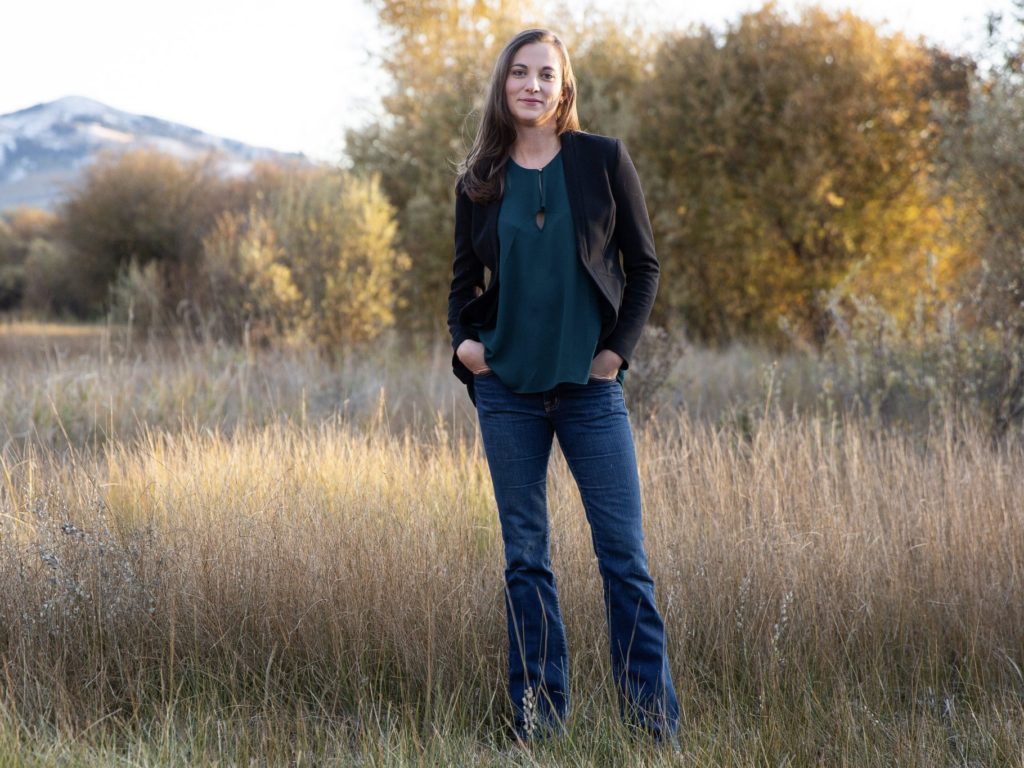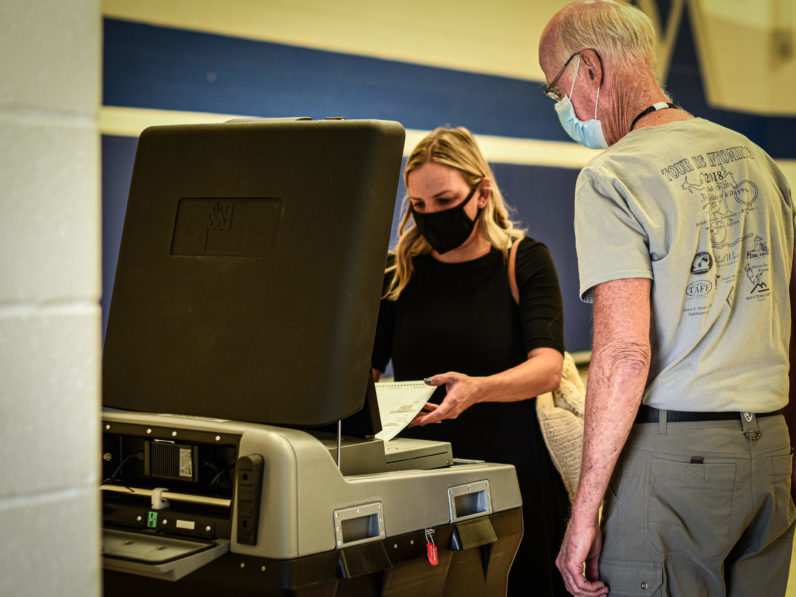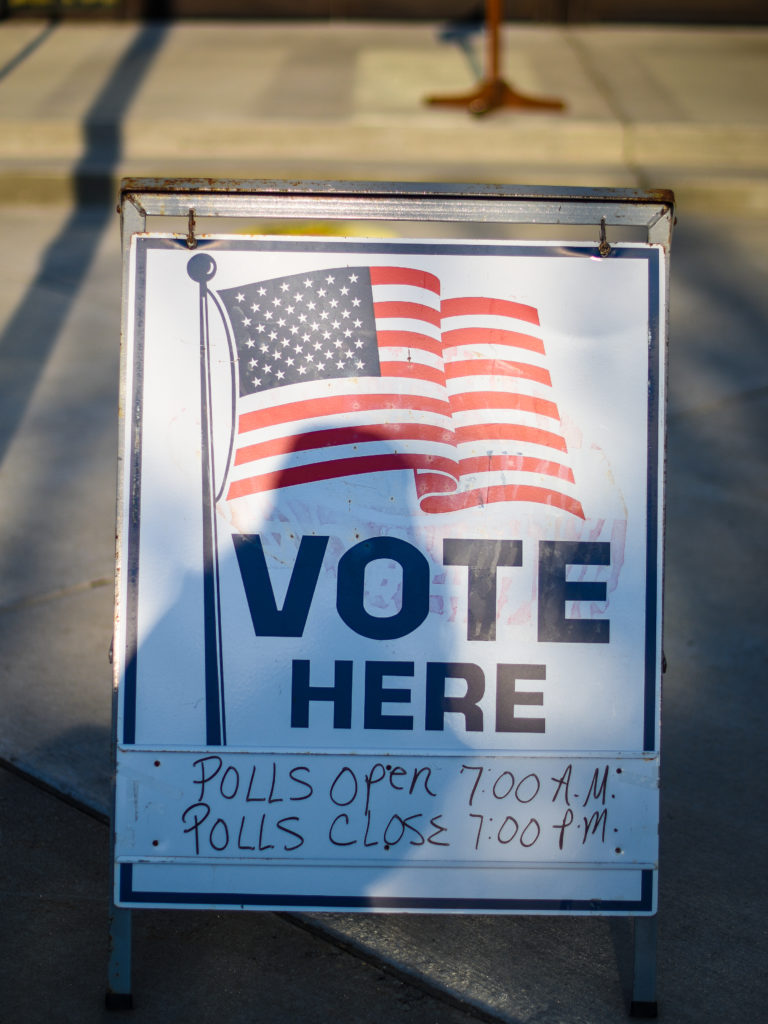On Tuesday, Israel Garcia,19, voted for the first time. He was inspired to vote in Wyoming’s primary election thanks to a high school class called “We the People” led by Jim Rooks, his former social studies teacher, and now the Jackson Town Council top vote-getter.
“We learned about our government and went and competed and that class opened my eyes to the different problems in the world and all the stuff that goes right over our heads,” Garcia said.
Garcia and a friend, both invigorated from their experience voting, went to dinner to celebrate.
Garcia was among the 5,798 people, or 41.6 percent of registered voters, that cast ballots in the primary election on Tuesday. While Garcia voted in person, many opted to vote early or via mail due to the COVID-19 pandemic. But that didn’t hurt participation. Overall turnout was higher than the 2016 primary, which drew 5,513 voters. Teton County clerk Maureen Murphy said the day went off without a hitch. Polls were adequately staffed and several election judges and voters told KHOL they felt safe with the extra space and constant sanitizing measures in place.
Still, voter turnout was a far cry from the valley’s general election voter numbers. In the last three general elections, turnout has hovered around an impressive 96 percent. In other words, this primary, where local races were largely uncontested, is likely only telling half the story.
Here’s what we know so far.
Rooks has amassed a voter contingency that stretches beyond his former students. According to unofficial results from the Teton County Clerk’s office, he garnered 1,441 votes or 35.3 percent—the most of any candidate in the nonpartisan Town Council race.
The longtime educator says he is running to “unify the community” and combat vitriol and partisanship that pervade national and even state politics.
Mayor Pete Muldoon followed in the polls Tuesday with 1,234 votes or 30.2 percent. During his mayoral tenure, Muldoon has advocated for the working class—he has been a strong supporter of affordable housing in particular. He also has acted fast amid the COVID-19 pandemic, enacting ordinances to slow the spread of COVID-19 when the county health officer struggled to obtain state approval on such measures.
Meanwhile, realtor Devon Viehman was third with 1,068 votes or 26.1 percent. Viehman has made housing central to her campaign. She wants to see “smart, sustainable growth” through a variety of housing options in the valley that meet the needs of different community members across the economic spectrum.
And that’s something Viehman and Muldoon sparred over during a political candidate forum last week. Muldoon asserted that Viehman has been working behind the scenes to undermine Jackson’s affordable housing program. He called into question Viehman’s association with Goshen County Rep. Shelly Duncan. Duncan sits on the Corporations, Elections and Political Subdivisions Committee and is among the state lawmakers that drafted legislation that would have dismantled Jackson’s affordable housing program.
Viehman rejected Muldoon’s assessment. “To insinuate that I am working behind the scenes with a legislator just because she is my friend is a record I have set straight numerous times,” Viehman said.
Viehman, Muldoon and Rooks will all advance to the general election. The question now is which write-in candidate will join them in vying for the council’s two open seats.
There were 339 votes for write-in council candidates and both Jessica Sell Chambers and Jennifer Ford mounted last-minute write-in campaigns. Chambers is running a campaign focused on supporting Jackson’s working class and marginalized populations. Ford, meanwhile, says she wants to diversify Jackson’s service-based economy and lower housing mitigation rates, which require developers to pay for a portion of employee housing. The suspense on who will advance ends Friday when the county clerk’s office releases detailed results on write-in votes.
The mayoral race, once uncontested, also has a write-in candidate likely to be on the ballot in November. Michael Kudar drew what appears to be an impressive number of write-in votes but he still has some work to do. Vice Mayor Hailey Morton Levinson had a strong showing in Tuesday’s primary, capturing 1,556 votes or 68.6 percent. Morton Levinson touts her eight years of experience on the council and focus on working families vis-á-vis her support for affordable housing, transportation policies, and a childcare initiative aimed to increase childcare access for working families.
The mayoral race clocked 711 write-in votes, or 31.3 percent, but it is unclear just how many of those were cast for Kudar. He is running on a platform focused on shaking up the status quo and strengthening partnerships between the public and private sectors. He laments housing projects that the Jackson Town Council has rejected, like a project for 155 homes that developer Larry Huhn proposed in Hog Island last year. Elected officials rejected that project because of concerns the housing would not remain affordable for Jackson’s workforce in the long-term but some still viewed it as a lost opportunity to help address the valley’s endless housing crisis.
County Front Runners Emerge
Least contentious yet nevertheless notable was the primary race for Board of Teton County Commissioners. All four candidates will advance to the general election, plus Independent candidate Wes Gardner who was not on the primary ballot. The business owner’s platform is anchored on four issues: housing, transit, social services and conservation.
On the Republican side, Peter Long received 1,969 votes, or 58.7 percent. Long has experience in the nonprofit and political milieus including as executive assistant to former Vice President Dick Cheney and on the National Security Council in the George W. Bush White House. He says making Jackson a livable community for people across the economic spectrum is a top priority. Christian Beckwith followed with 1,234 or 36.7 percent. Beckwith is a longtime mountaineer, writer and editor and founder of the SHIFT Festival. Conservation and community character are at the forefront of his platform.

Chair of the Board of Teton County Commissioners Natalia D. Macker is the Democratic front runner in her race. (Courtesy photo)
On the Democratic side, the top vote-getter in this two-seat race is Teton County Commissioner Natalia D. Macker. She captured 2,444 votes, or 53.7 percent. Fellow Democratic incumbent Greg Epstein drew 1,950 votes or 42.8 percent. He has highlighted his experience on the board, commitment to solving the valley’s transportation issues, and moderate stances that allow him to work across the aisle.
Notably, Macker, chair of the Board of Teton County Commissioners, stands out in several ways. She is the sole woman on her board and the only woman among the candidate pool. And she has made the needs of women and working families central to her policymaking by supporting affordable housing and working to increase access to childcare for working families.
During a political candidate forum last week, she also appeared best equipped to tackle issues of diversity and representation in Jackson Hole. The candidates vying for a seat on the commission are all white and some stumbled over a question about improving representation for Jackson’s Latinx population and other folks of color. Macker outshined other candidates by offering actionable ways to address the valley’s structural inequities.
She said the government must play a critical role. Macker stressed that this type of work cannot be completed in a few years or even the four-year term of an elected official. Rather, it is the type of work she imagines doing “for the rest of my life.” Specifically, she wants to require diverse representation on appointed boards and commissions. That will build the pipeline of leadership in the community so “we don’t have elected boards that don’t represent our community,” she said. Macker suggested translating documents, performing an equity audit, and increasing access to meetings—a measure that Long echoed. A land acknowledgment to recognize the Indigenous people who first settled on the valley’s land is also something Macker would like to see.
Wyoming Women to Dominate Washington
While the race for Board of Teton County Commissioners has just one woman candidate, the same cannot be said for Wyoming’s federal races which are seeing historic female representation. The Republican and Democratic candidates who clinched the top spot in Wyoming’s race for U.S. Senate and U.S. House of Representatives are women.
“How awesome is that?” Nathan Wendt wrote on Twitter. “Honored I was a part of it.”
Wendt, a Teton County resident, was running as the Democratic candidate for Sen. Mike Enzi’s seat in the U.S. Senate. He lost to Dr. Merav Ben-David, but said “it was an incredible positive” that his defeat contributed to a rise in women candidates up and down the ballot.
Ben-David, a scientist and University of Wyoming professor, will face Republican Cynthia Lummis, Wyoming’s former four-term U.S. Representative, in the race for U.S. Senate.
But perhaps the most interesting contest is for Wyoming’s lone seat in the U.S. House of Representatives. It is between Northern Arapaho and Hunkpapa Lakota tribal member Lynnette Grey Bull and incumbent Rep. Liz Cheney. If Grey Bull is elected, it is believed she would be the first Native American to represent Wyoming in Congress.
Grey Bull said she respects Cheney as a female leader and she realizes she has a big fight ahead. But, she said, she hopes to reveal Cheney’s true intent and motives. Grey Bull says she represents everyday people while her opponent represents millionaires and billionaires.
An advocate for missing and Indigenous women and a lobbyist for environmental justice, Grey Bull is the vice president of the Global Indigenous Council, an Indigenous rights organization. She has a knack for “bringing stories from the community to the federal level,” she told KHOL, and touts her experience working with Democrats and Republicans to represent marginalized communities.
Grey Bull wants to diversify Wyoming’s energy sector, create a more equitable state for underrepresented people and the working class, and protect public lands. She pointed to recent federal parcels of land sold off to companies in the extractive industry that are based in states like New York, Colorado and Texas. “Some of these parcels were sold for as little as two dollars. But a person like me or you, we can’t go buy an acre for two dollars, so why should million- or billion-dollar companies be able to do that?”







